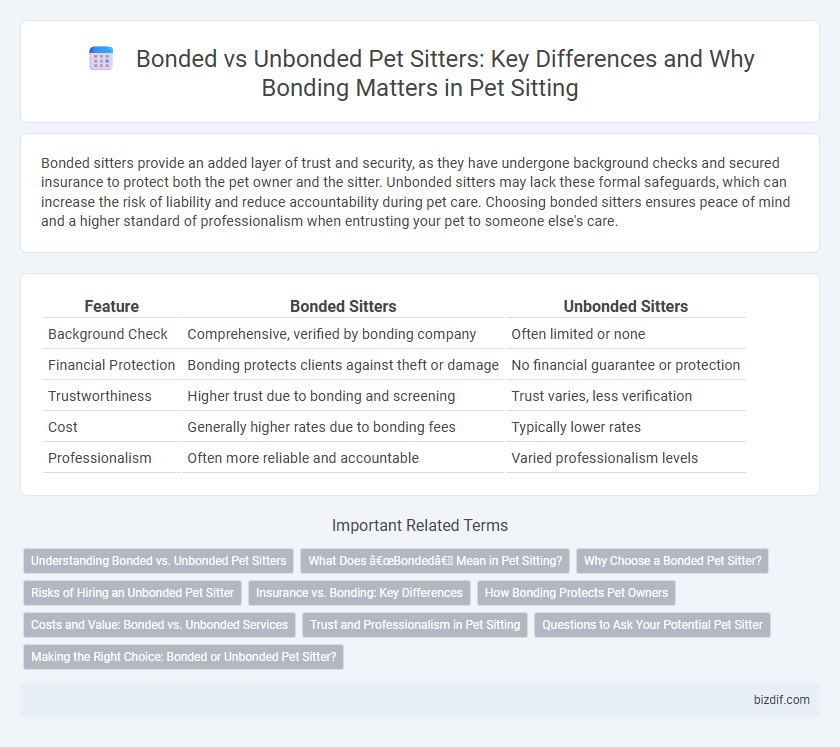Bonded sitters provide an added layer of trust and security, as they have undergone background checks and secured insurance to protect both the pet owner and the sitter. Unbonded sitters may lack these formal safeguards, which can increase the risk of liability and reduce accountability during pet care. Choosing bonded sitters ensures peace of mind and a higher standard of professionalism when entrusting your pet to someone else's care.
Table of Comparison
| Feature | Bonded Sitters | Unbonded Sitters |
|---|---|---|
| Background Check | Comprehensive, verified by bonding company | Often limited or none |
| Financial Protection | Bonding protects clients against theft or damage | No financial guarantee or protection |
| Trustworthiness | Higher trust due to bonding and screening | Trust varies, less verification |
| Cost | Generally higher rates due to bonding fees | Typically lower rates |
| Professionalism | Often more reliable and accountable | Varied professionalism levels |
Understanding Bonded vs. Unbonded Pet Sitters
Bonded pet sitters have obtained a surety bond that offers financial protection against theft or damages, providing peace of mind for pet owners. Unbonded sitters lack this additional security, which may increase the risk in case of unforeseen incidents during pet care. Choosing bonded sitters ensures a higher level of trust and accountability when entrusting your pet's well-being.
What Does “Bonded” Mean in Pet Sitting?
"Bonded" in pet sitting refers to a sitter who has secured a surety bond, providing a financial guarantee that protects clients against potential losses caused by theft, damage, or negligence. This bond offers peace of mind by ensuring reimbursement up to a specified limit if the sitter fails to fulfill their responsibilities. Pet owners seeking bonded sitters benefit from enhanced trust and security compared to unbonded caregivers, who lack this formal financial protection.
Why Choose a Bonded Pet Sitter?
Choosing a bonded pet sitter ensures financial protection and legal accountability, offering peace of mind if theft or property damage occurs during pet care. Bonded sitters undergo background checks and secure a surety bond, demonstrating professionalism and trustworthiness. This added layer of security distinguishes bonded sitters from unbonded ones, making them a safer choice for your pet's well-being and your home's safety.
Risks of Hiring an Unbonded Pet Sitter
Hiring an unbonded pet sitter presents significant risks, including the potential for financial loss due to theft or damage without any recourse for reimbursement. Unbonded sitters lack the protection of a surety bond, which safeguards clients against negligence or misconduct during pet care. This absence of bonding increases the likelihood of liability issues and diminishes trust in the sitter's accountability and professionalism.
Insurance vs. Bonding: Key Differences
Bonded sitters hold a surety bond that protects clients against financial loss caused by negligence or theft, providing a layer of security beyond liability insurance. Insurance covers liability for accidents or injuries during pet care but does not guarantee reimbursement for client property damage or theft like bonding does. Clients seeking comprehensive protection should prioritize sitters who are both bonded and insured to ensure financial safeguards and peace of mind.
How Bonding Protects Pet Owners
Bonded sitters provide pet owners with financial protection by securing a surety bond that covers potential losses from theft or damage, enhancing trust and security during pet care. This bonding ensures reimbursement up to the bond's limit if the sitter commits any dishonest acts. Pet owners benefit from peace of mind knowing their pets and property are safeguarded against unforeseen issues.
Costs and Value: Bonded vs. Unbonded Services
Bonded pet sitters typically incur higher fees due to insurance and security measures that protect against theft or damage, providing greater financial value and peace of mind for pet owners. Unbonded sitters usually offer lower rates but lack this formal protection, increasing risk exposure in case of incidents. Investing in bonded services ensures accountability and potential reimbursement, making it a cost-effective choice for safeguarding pets and property.
Trust and Professionalism in Pet Sitting
Bonded sitters provide verified financial protection and assurance, reflecting higher trustworthiness and professionalism in pet sitting services. Unbonded sitters lack this formal safeguard, which may increase risks for pet owners regarding liability and reliability. Choosing bonded sitters ensures accountability and confidence in the care provided for pets.
Questions to Ask Your Potential Pet Sitter
When evaluating bonded sitters versus unbonded sitters, ask about their bonding status to ensure financial protection in case of theft or damage. Inquire if they carry insurance and have undergone background checks, which add layers of security and reliability. Clarifying experience with specific pet breeds and emergency protocols helps determine their preparedness and professionalism.
Making the Right Choice: Bonded or Unbonded Pet Sitter?
Choosing between bonded and unbonded pet sitters depends on security and trust needs; bonded sitters provide financial protection against theft or damage, offering peace of mind. Unbonded sitters might offer lower rates but lack this insurance coverage, increasing potential risks. Evaluate the sitter's bonding status alongside experience and references to ensure the safest care for your pet.
Bonded sitters vs Unbonded sitters Infographic

 bizdif.com
bizdif.com